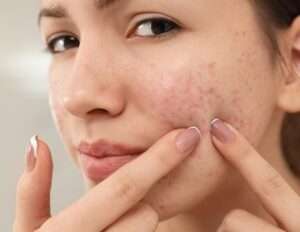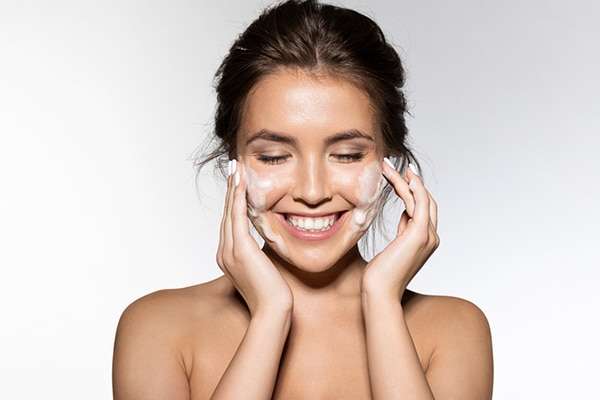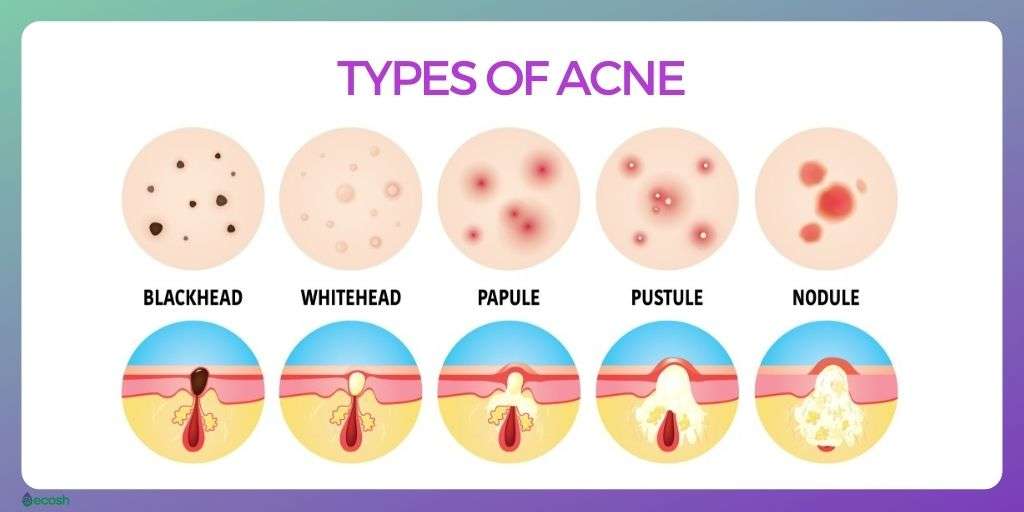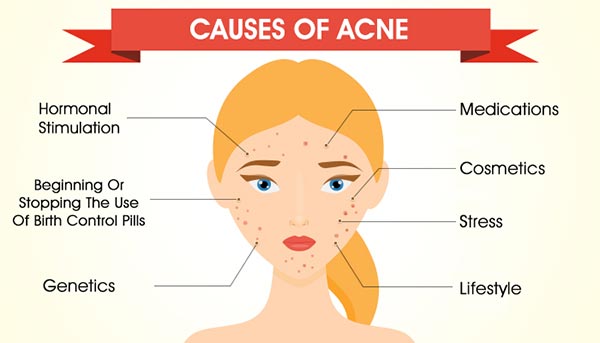Acne Treatment in Mumbai

Acne is a common skin condition that affects millions of people each year. Various factors, including hormonal changes, genetics, stress, and certain medications, cause it.
According to the American Academy of Dermatology (AAD), acne can be classified as mild, moderate, or severe and manifest as blackheads, whiteheads, pustules, cysts, or nodules.
Research has shown that dermatologists play a crucial role in managing acne and can provide effective treatment outcomes for patients.
Dr. Anju Methil, a prominent skin specialist in Mumbai, is an expert in providing comprehensive treatment for acne, including topical and oral medications, lifestyle modifications, and various procedures to improve the appearance of acne scars.
You can consult her for personalized acne treatment in Mumbai at The Skin & Shape Clinic in Andheri, West.
How is acne diagnosed?
Dr. Anju Methil, one of the best dermatologist for acne in Mumbai, usually diagnoses acne through a physical examination based on the appearance of the skin, medical history, and a discussion of the patient’s symptoms.
During the physical examination, she examines the skin for acne lesions, such as blackheads, whiteheads, and pimples, and evaluates their size, shape, and color.
Sometimes, she may perform additional tests to rule out other possible skin condition causes, such as blood tests or a skin biopsy.
What are the different options for acne treatment in Mumbai?
Many advanced options are available for safe and reliable acne treatment in Andheri West at The Skin & Shape Clinic, ranging from over-the-counter products to prescription medications and procedures.
Our experienced doctor will formulate a customized treatment plan depending on your case’s severity and the type of acne.
Teenage Acne
Teenage acne is a prevalent skin problem caused by hormonal changes during puberty. It can lead to inflammation, scarring, and psychological distress. If you’re looking for acne treatment in Mumbai, there are many options available, such as topical medications, oral medications, laser therapy, and chemical peels.
Adult Acne
Adult acne is a common skin condition that affects individuals over the age of 25. It can be caused by hormonal imbalances, stress, and lifestyle factors. Treatment options for adult acne may include topical medications, oral medications, and lifestyle changes such as a healthy diet and exercise.
Post Acne Pigmentation
Post-acne pigmentation is a scar that remains after acne. When the acne is deeper and heals with scarring, it can appear as cysts. They can also occur as a dark spot that can be a hyperpigmentation spot and be red, brown, or a combination of the two.
Back Acne
Bacne is skin disease characterized by pimples, blackheads, and whiteheads on the back. It can be caused by a combination of factors such as hormonal changes, genetics, and lifestyle habits. If you’re seeking treatment for back acne, a dermatologist in Andheri, Mumbai can provide a range of options.
PCOD related Acne
PCOD is a hormonal disorder that can cause acne in women due to increased androgen levels. The acne associated with PCOD can be stubborn and challenging to treat. However, there are various options for acne treatment in Mumbai, such as topical creams, oral medications, and laser therapy, that can help manage the condition.
Post-acne Scars
Post-acne scars are the marks or indentations that remain after acne has healed. They can be unsightly and impact an individual’s self-confidence. A dermatologist can recommend the most appropriate treatment for your skin type and the severity of the scars.
Check out the different types of treatments offered by Dr. Anju Methil, one of the best dermatologist for acne in Mumbai.
Topical Medications: These are applied directly to the skin and can include retinoids, benzoyl peroxide, and antibiotics. They work by unclogging pores, reducing inflammation, and killing bacteria.
Oral Medications: These include antibiotics, isotretinoin, and hormonal medications such as birth control pills. They work by reducing inflammation, killing bacteria, and regulating hormones.
Combination Therapy: This method involves combining two or more treatments, such as topical and oral medication.
Light Therapy: Here, the skin is exposed to specific types of light, such as blue or red light, to reduce inflammation and eliminate bacteria.
Chemical Peels: This involves applying a chemical solution to the skin to exfoliate the top layer and improve the appearance of acne scars.
Extraction: The doctor removes the blackheads and whiteheads manually using specialized tools.
Intralesional Injections: The doctor injects a corticosteroid medication directly into a cyst or nodule to reduce inflammation and promote healing.
Laser Therapy: Lasers help to target and destroy the bacteria responsible for acne, as well as to reduce inflammation and promote healing.
Microdermabrasion: It is the most opted acne scar treatment in Mumbai. It uses a specialized device to gently exfoliate the top layer of skin, which can help to unclog pores and improve the appearance of acne scars.
Microneedling: The doctor uses a device with small needles to create tiny punctures in the skin, stimulating collagen production and improving the appearance of acne scars.
Cryotherapy: Here, liquid nitrogen is used to freeze and destroy acne lesions.
Please note some treatments may take several weeks or months to show results, and there may be side effects associated with certain medications and procedures.
What are the different types of acne?
Some of the most common types of acne include:
Blackheads are non-inflammatory lesions that appear as tiny black dots on the skin’s surface. They form when hair follicles become clogged with oil and dead skin cells, and the pore remains open.
Whiteheads are also non-inflammatory lesions, but they are covered by a thin layer of skin, giving them a white or flesh-colored appearance. They occur when hair follicles become clogged with oil and dead skin cells, and the pore is closed.
Papules are small, red, raised bumps on the skin’s surface that may be tender to the touch. They occur when hair follicles become inflamed and infected.
Pustules are similar to papules, but they contain pus, a mixture of white blood cells, bacteria, and dead skin cells. They appear as small, red bumps with a white or yellow centre.
Cysts are deep, pus-filled lesions that can be painful and cause scarring. They form when the infection in the pustule or other acne lesions spreads deeper into the skin.
Nodules are large, solid, painful lesions deep within the skin’s layers. They form when the infection in a cyst spreads even deeper into the skin.
Different types of acne can co-occur, and the severity and treatment approach for acne can vary depending on the type and individual circumstances.
If you are experiencing acne, it is best to consult a dermatologist for a proper diagnosis and treatment plan, as some acne tends to leave scars.
What are the causes of acne?
Some of the most common factors that can contribute to acne include:
Hormonal Changes: Hormonal changes during puberty, menstruation, pregnancy, and menopause can cause an increase in sebum production, leading to the development of acne.
Genetics: Acne can be hereditary, so if your parents or siblings have acne, you may be more likely to have it.
Diet: Although the link between diet and acne is still being researched, some studies suggest that certain foods, such as dairy, high-glycemic-index foods, and foods high in saturated and trans fats, may contribute to the development of acne.
Stress: Stress can trigger the release of hormones that increase sebum production, leading to acne.
Medications: Some medications, such as corticosteroids, testosterone, and lithium, can trigger acne breakout.
Environmental Factors: Exposure to certain environmental factors, such as pollution, humidity, and sweating, can result in acne.
Poor Skin Care: Failing to cleanse and care for the skin properly can lead to the accumulation of oil, dirt, and dead skin cells, which can cause acne.
How to prevent acne?

Dr. Anju Methil, a leading skin specialist in Mumbai, provides some valuable tips for preventing acne:
- Wash your face twice a day with a gentle cleanser to remove oil, dirt, and sweat. Avoid over-washing or using harsh products, which can irritate the skin and worsen acne.
- Choose non-comedogenic skincare and makeup products, meaning they won’t clog pores and contribute to acne.
- Avoid touching your face with your hands, as this can transfer oil and bacteria to the skin and contribute to acne.
- Avoid picking or squeezing acne lesions as they can lead to scarring and spread bacteria, leading to further breakouts.
- Stress can trigger acne breakouts, so practice stress-reducing techniques such as yoga, meditation, or deep breathing exercises.
- A healthy, balanced diet with plenty of fruits, vegetables, and whole grains benefit skin health.
- Drink plenty of water to keep your skin hydrated and healthy.
- If you are experiencing frequent or severe acne, it is best to consult with a dermatologist to determine the underlying cause and develop an appropriate treatment plan.
Why choose Dr. Anju Methil for acne treatment in Mumbai?
- Anju Methil is a highly trained and experienced dermatologist with expertise in treating acne and other skin conditions.
- The Skin & Shape Clinic offers a range of acne treatment in Andheri West, including topical and oral medications, light therapy, chemical peels, and more.
- The clinic uses state-of-the-art equipment and advanced techniques to provide safe and effective acne scar treatment in Mumbai.
- Anju Methil and her team take a personalized approach to each patient’s treatment, tailoring the treatment plan to their needs and concerns.
- The clinic offers a comfortable and welcoming environment, with a friendly and professional staff dedicated to providing the highest level of care.
Frequently Asked Questions
It takes at least four to six weeks for acne treatment to start showing results. You should be patient and stick with your treatment plan to see the best results.
The best way to prevent acne is to moisturize your skin. Washing your face twice a day with a gentle cleanser and using a non-comedogenic moisturizer can help reduce the risk of acne breakout.
No, not all types of acne leave scars. Mild forms of acne, like whiteheads and blackheads, rarely leave scars. However, more severe types of acne, like cysts and nodules, often result in acne scars.
The effectiveness of laser therapy in treating acne depends on the type of acne and the individual’s skin type. Laser therapy can reduce inflammation and the appearance of acne scars.
It can also help reduce the size of pores and decrease oil production. Additionally, laser therapy can decrease bacteria that causes acne.



